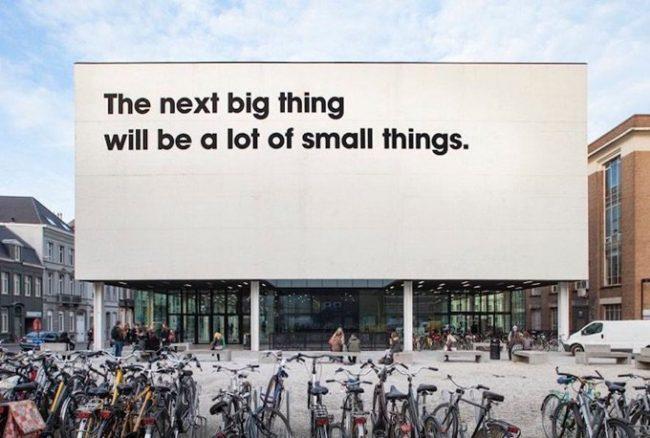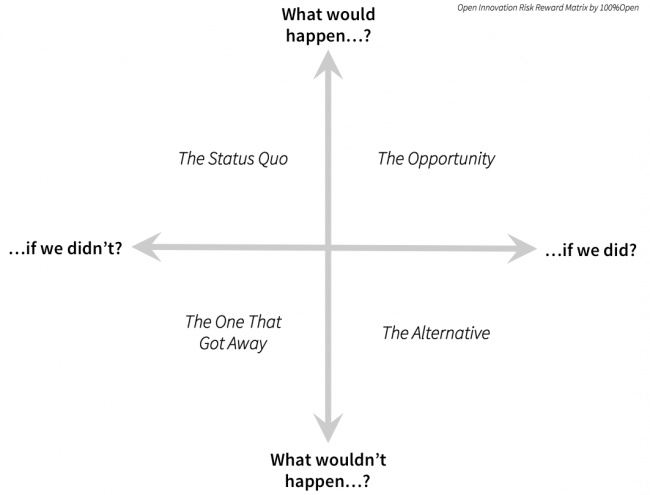To Do or Not To Do…?
As we approach New Year it’s a time to prioritise what we do and don’t want to do next year. 2016 has been pretty eventful and it looks like we’ve got our work cut out in 2017 so we all want to know what is going to be the next big thing?

When it comes to open innovation, there are no shortage of good ideas to pursue or interesting partners to collaborate with. The two biggest mistakes is to either i) back the wrong horse, or to ii) fail to back the right horse. Most people or organisations focus too much on avoiding making the first mistake. However they do not focus enough on avoiding making the second mistake. This is because we prefer avoiding losses to acquiring equivalent gains – a phenomenon known as loss aversion. Loss aversion is grounded in the fear of the unknown that in our experience is the biggest cultural barrier to open innovation.
“What Would You Do If You Weren’t Afraid” Facebook
So here are four questions to help you think through all of the possible consequences of any decision that you might be considering:
- What would happen if you did?
- What wouldn’t happen if you did?
- What would happen if you didn’t?
- What wouldn’t happen if you didn’t?
Most people or organisations only tend to ask themselves the first question and because the answer is uncertain, the chances are they will not proceed as they want to avoid backing the wrong horse. However by making sure that you ask yourself all four of these questions you can make a more informed decision about both the potential risks and rewards of any new idea or action, as follows:

- The Opportunity – By trying something new the only guaranteed outcome would be that you would learn something which in itself might be a sufficient reason to proceed. In addition you might even create new value and make a positive difference as well. Of course you may forgo some short term benefits or comfort and of course it might not work and if so you might be held responsible and could become the scapegoat if it doesn’t. However you could also be recognised and rewarded for taking the risk, even if it doesn’t pay off first time, so long as you can implement what you’ve learned.
- The Alternative – Every time you try something new you need to use time, money and effort that could be deployed elsewhere. So first of all it’s important to asses the relative value, risks and effort of all of the alternatives, and ensure that you have selected the optimum based on a combination of hard data and gut feel. It is seldom the case that you can predict the opportunity cost in advance but increasingly it is possible to gather quantitative data on a range of possible futures (using online concept testing for instance) and select the one that shows the most promise and demand.
- The Status Quo – The safest and lowest risk course of action in the short term is always to do nothing. Not to try anything new and to do what you’ve always done. Sometimes it’s wrong to rock the boat and you certainly don’t want to throw the baby out with the bathwater. Nobody is likely to hold that against you for now but you could be held accountable later for inaction. Alternatively you could come to benefit from sticking with the current course. Changing for the sake of it can be a mistake but sustaining business as usual always leads eventually to managed decline. However do you really think that current problems will go away or be solved without doing something about it?
- The One That Got Away – They say that you only regret the things you haven’t done rather than the things that you have done. Again this is because you never know how things might have turned out if you didn’t try them in the first place. The missed opportunity seldom results in new learning or new value. Nothing will change, nobody will notice and the current challenges will only increase. Nobody will commend your bravery and you could be remembered as the one who wouldn’t act, who didn’t back the right horse, and you could end up looking and feeling foolish.
So what are you waiting for? There is no time like the present to tackle all manner of social and commercial challenges. And there is no shortage of partners to work with. Everything big starts small so perhaps it will be lots of small things as per the mural at the University of Ghent above.
“I’d rather regret the things I’ve done than regret the things I haven’t done.” Lucille Ball
But remember, open innovation is always a leap of faith. Whether you believe an idea or a partnership will or won’t work, either way you are probably right. But we’ve learned that sharing risk creates it’s own rewards and so whatever you both decide to do, or not to do, I hope you have a very happy, open and innovative new year.
Image credit: Tessy Britton